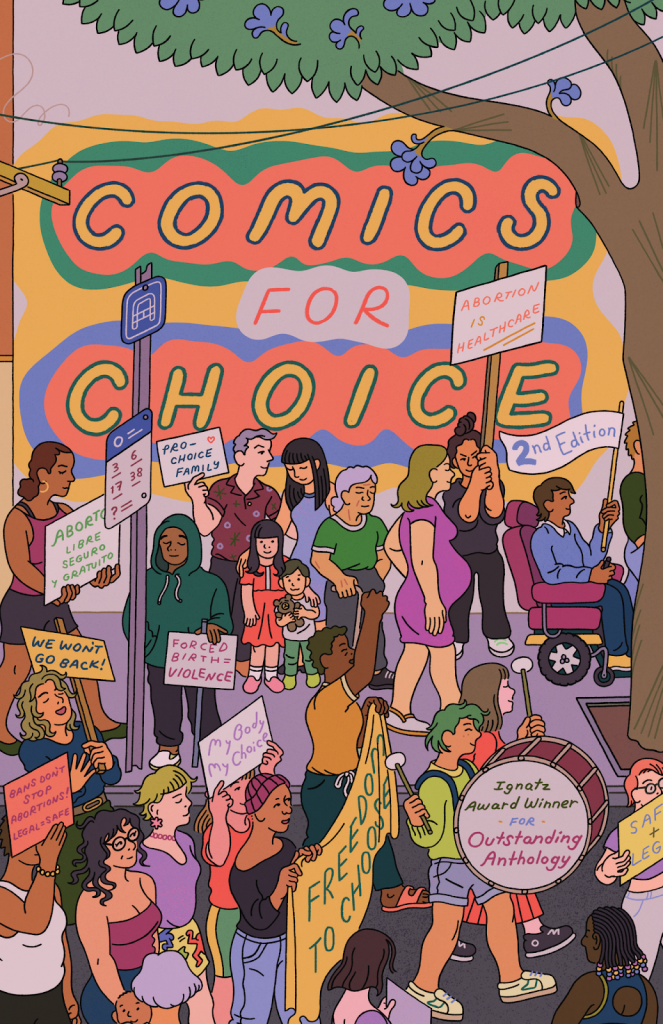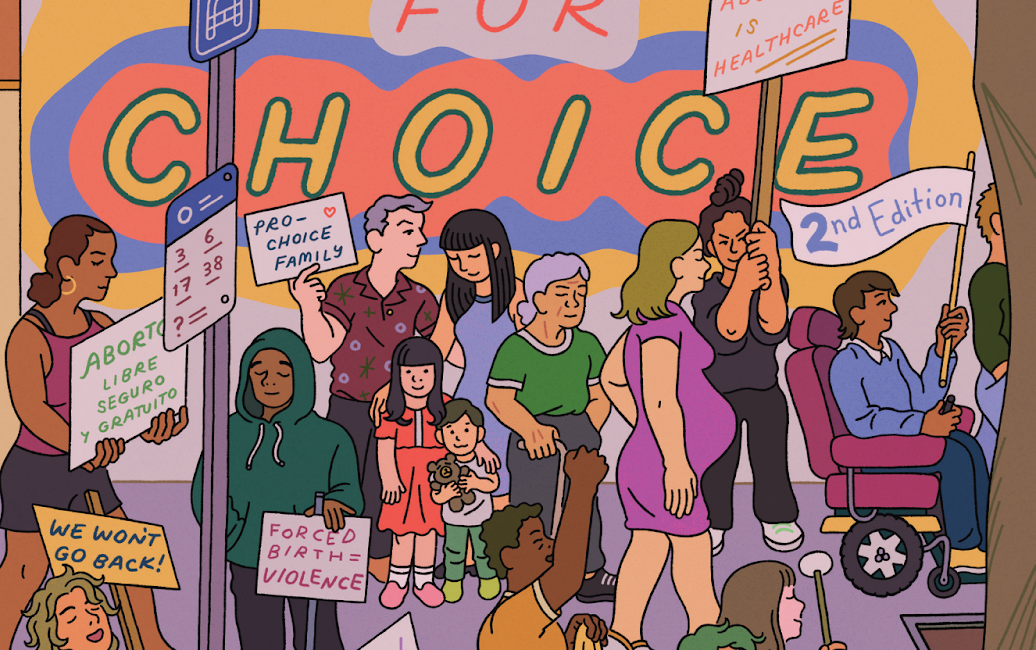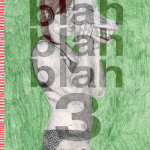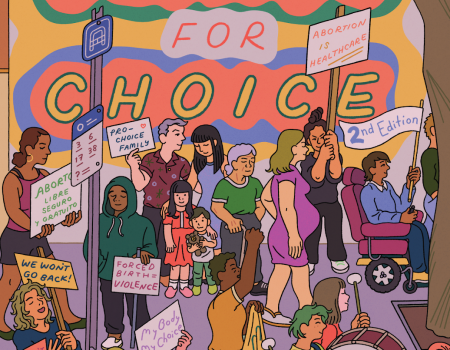I remember standing in the doorway of my old bookstore job, getting ready to open up for work the day that Roe v. Wade was overturned. I remember a heavy pit in my stomach as the news rolled in, not really knowing what to feel once it actually happened. Knowing the decision was coming up, and from a government that didn’t care if people died as a result of their actions didn’t make it feel any less jarring. After breaking the news to my comrade working with me that morning, we both stood in silence for a while before going into a long hug and assuring each other we were going to get through this today. Both of us took turns acknowledging that if we had to be anywhere right now, being here in a community space is where we’d want to be.

Approaching the one-year anniversary of the Supreme Court ruling in Dobbs v. Jackson Women’s Health Organization, the fight for reproductive rights has been filled with increased hostility and near total, if not total abortion bans in North Dakota, Missouri, West Virginia, and Georgia among other states passing new legislation. Given all this, it’s been a great comfort to revisit the newly expanded Comics for Choice, which released a 2nd edition in March of this year. This comics anthology for reproductive justice has always been an incredible collection to fight back against abortion stigma and now, 50 years after the original decision for Roe v Wade, it’s more relevant than ever.
Comics for Choice was originally released in July of 2017 as a self-published anthology raising money for National Network of Abortion Funds, before later being picked up for distribution by Silver Sprocket. Flipping through this new edition without even getting into the new additions, the pages already stand out as being of a thicker stock, catching more on the light with inks that stand out as much as they should on here. It’s clear that there was thought put into making this new printing feel like the definitive edition of the anthology along with having new comics.
Speaking of, there are two new comics that introduce the 2nd edition alongside the existing work, and are welcome additions, bringing the total package to a whopping 44 comics and 69 contributors. Mission Abolition: Against Adoption and Abortion Bans is a great first comic to ring in the revised anthology, tying together the right for bodily autonomy with interconnected struggles with adoption and family regulation. With a video game/tabletop style pastiche, Lizartistry and Leah Nichols break down the common “Don’t Abort, Adopt” tactic used by anti-abortion protestors for what it really is – a way to terrorize people with uteruses into further limiting their choices and sink more money into a white supremacist adoption industrial complex. The end goal of this, to deny self-determination and autonomy to children and adults alike paints a grim picture of the state deciding which families are legitimate and which ones aren’t, something further complicated by decreased access to safe reproductive care.
When Life Gives You Lemons similarly tackles another subject touched upon but not directly addressed in the book, teen pregnancy and abortions. Written by Ke’Asia Brown & Alicia, with art by Maddie Dennis and Comics for Choice editor Hazel Newlevant, the story of Emma and Sarah is a painfully real one for so many teenagers who find themselves pregnant and want to exercise their own autonomy separate from their parents. “I had trouble allowing myself to reckon with the scale of what Roe v. Wade’s overturn meant. Working on the comic with Hazel, Ke’Asia, and Alicia allowed me to process some of that on a smaller scale.” – Maddie Dennis, speaking to SOLRAD.
Lemons pushes to the forefront that, while many people’s only reference for teen pregnancy is just another statistic, teenagers with uteruses are living that reality every day with fear of abortion access heightened for minors. Whether it’s wanting to go to med school, not being ready for a family, or not wanting a child at all, the ultimate issue at hand — freedom of choice — is even more difficult when a minor has to go to court to even allow for that freedom.
Along with some comics being updated to keep their sources up to date from 2017, some comics like They Called Her Dr. D have also been updated with fresh art which shows the clear progression these cartoonists have had in the 6+ years since these comics were originally submitted.
“For me, as I’m sure with the other contributors, revisiting Comics For Choice came with mixed feelings”, artist Jaz Malone commented. “I love that we get to delve back into these stories and add updates to the words and imagery. I personally really enjoyed figuring out how to update my pages. I’m also sad that the US is in a place where a second publishing of stories about abortion is absolutely necessary. Comics For Choice is a phenomenal way for a large group of people to come together and say out loud, ‘We will not go back,’ and projects like it give me hope.”
Despite many of these stories appearing unchanged from their original text, they still read as though they could have been written today and be just as timely and prescient, if not more so. The fight for reproductive rights is still ongoing and in many ways, has actively gotten worse in the 6 years since Comics for Choice was originally published. It’s been proven time and time again that whether abortions are legal or not doesn’t prevent them from happening, it just makes it harder for abortions to be done safely.
Sage Coffey, another cartoonist contributor to Comics for Choice, replying to SOLRAD about their work stated, “I’m really grateful C4C is being republished, not only because of the important abortion history and personal experiences told within the anthology, but because [of] its larger place in trans-inclusive RePro activism! This collection highlights a necessary point in the fight against fascist control over our bodies; that we’re all fighting against it together.” While it can be said that every piece of media is representative of the time, place, and conditions it was made under, activist works like Comics for Choice truly do stand out as a record of the struggles collectively undertaken by each contributor and everyone alongside them in the fight for abortion access and more broadly, bodily autonomy.
Maddie Dennis, again, sums this sentiment up quite nicely. “I hope that for readers who also felt overwhelmed by the news, these individual stories are a way to come back to understanding our interconnectedness.”
SOLRAD is made possible by the generous donations of readers like you. Support our Patreon campaign, or make a tax-deductible donation to our publisher, Fieldmouse Press, today.




